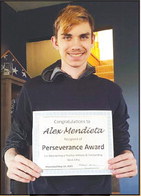NO SIGHT, NO SOUND


Granton teen and family adapting to new reality as Usher’s Syndrome steals his senses
April Konkol just wants what’s best for her son, Alex ...


Granton teen and family adapting to new reality as Usher’s Syndrome steals his senses
April Konkol just wants what’s best for her son, Alex ...